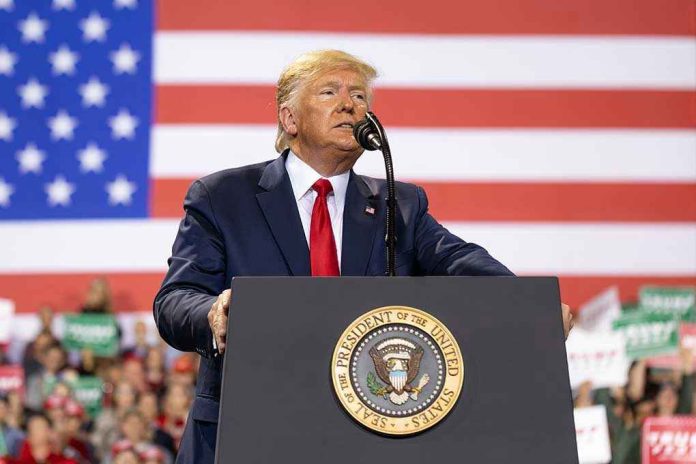
President Trump’s move to block state AI laws signals a seismic battle over who controls America’s technology future—and whether “woke” agendas will shape the code that runs our lives.
Story Snapshot
- Trump administration eyes federal executive order to override state-level AI regulations, sparking fierce debate over states’ rights and federal power.
- All 50 states have introduced their own AI bills, creating a complex patchwork of rules and compliance headaches for businesses.
- The White House frames the initiative as a defense against “woke” bias in AI, prioritizing ideological neutrality and innovation.
- Legal and political conflict looms as states threaten lawsuits and tech industry leaders weigh in on the need for regulatory consistency.
Trump Administration Targets State-Level “Woke” AI Laws
In July 2025, President Trump signed an executive order mandating “Unbiased AI Principles” for all federal agency procurement, explicitly rejecting any form of ideological or “woke” bias in artificial intelligence systems.
The administration’s rationale centers on the threat that state-level AI laws—many of which embed diversity, equity, and inclusion (DEI) mandates—pose to business innovation and constitutional freedoms. This order marks a clear federal pushback against what the White House calls “ideologically driven” regulation by the states.
Momentum for state AI regulation has exploded, with all 50 states introducing at least one AI-related bill in 2025. These laws range from efforts to address election security and criminal justice to sweeping new requirements for fairness and transparency in algorithms.
As a result, the country faces a confusing and costly patchwork of standards. Businesses and technology vendors, already struggling to comply, now face the prospect of conflicting state and federal rules—a scenario the Trump administration warns could stifle innovation and undermine the nation’s global competitiveness.
Federal Preemption: A Battle for Constitutional Authority
The Trump administration is now considering a bold executive order that would preempt or block state AI regulations entirely, asserting the need for a single, unified federal approach.
Supporters argue this would prevent activist state officials from forcing “woke” standards onto technology used nationwide, while critics warn it would trample on states’ rights. The White House contends that only federal authority can ensure AI systems remain free from political manipulation and protect fundamental liberties such as free speech and due process.
Legal scholars note that while federal preemption is constitutionally permissible—especially in areas affecting interstate commerce—it is rarely invoked so aggressively in emerging technology policy. The ongoing debate is poised to test the balance of power between Washington and the states at a moment when technology, politics, and civil liberties are deeply intertwined.
Tech Industry, States, and Advocacy Groups Brace for Showdown
The technology sector, for its part, largely favors federal preemption, citing the untenable costs and risks of navigating fifty different legal regimes. Industry leaders warn that a regulatory patchwork could drive innovation overseas and disadvantage American companies.
States, however, are preparing for a legal fight, defending their authority to regulate in the public interest. Some governors have threatened to sue if the federal government overrides their laws, raising the specter of a landmark Supreme Court case that could reshape the boundaries of state and federal power for years to come.
Civil liberties and advocacy groups remain divided. While some see value in state-level experimentation to protect against AI bias and abuse, others warn that politicized standards—whether at the state or federal level—risk undermining transparency and accountability.
The result is a fraught, highly politicized debate that may well become a central issue in the 2026 midterm elections and beyond.
Potential Impacts on American Innovation and Constitutional Rights
In the short term, the looming executive order creates significant uncertainty for businesses and consumers alike. Companies must prepare for shifting compliance requirements, while consumers may see changes in how AI systems operate and protect their rights.
In the long run, the Supreme Court could be called upon to decide whether the federal government has the authority to override state protections—or whether states can continue to chart their own course in regulating AI. The outcome will set a crucial precedent, not only for artificial intelligence, but for the broader principle of federalism at the heart of the U.S. Constitution.
As the debate intensifies, Americans who value individual liberty, limited government, and constitutional rights have reason to watch closely. The push to block state “woke” AI laws is about more than technology—it’s a fight over who decides the values embedded in the tools that govern our lives, and whether our government will defend or dilute the principles at the core of our republic.
Sources:
White House Executive Order, July 23, 2025: “Preventing Woke AI in the Federal Government”





